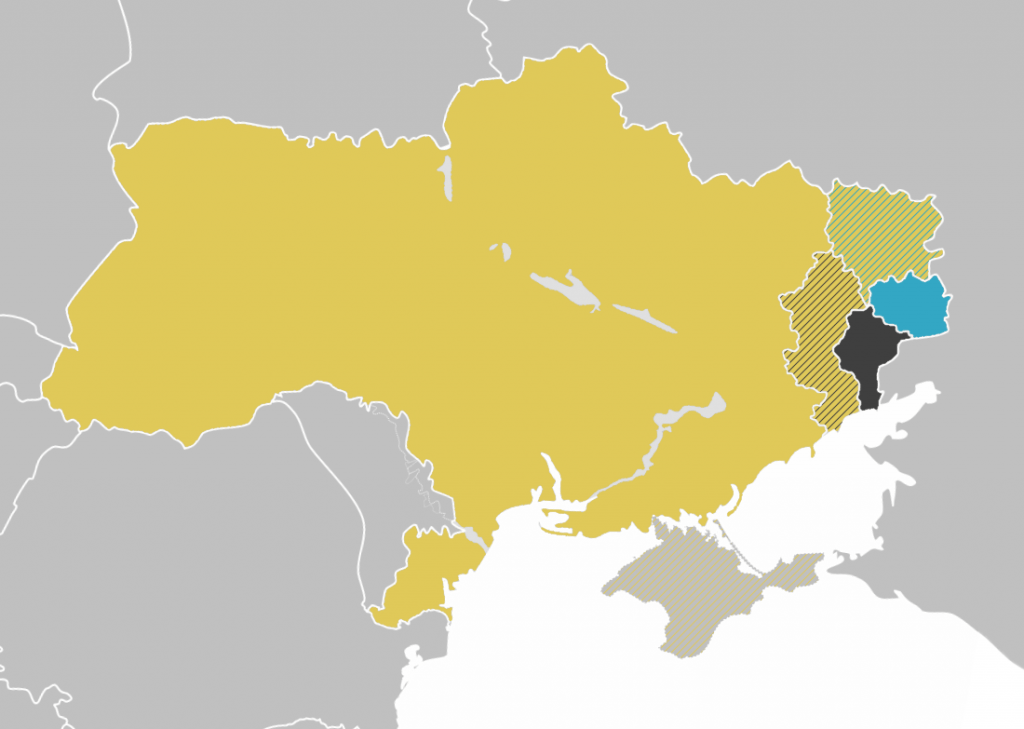Russia vague on whether militants will try to claim entirety of Donetsk, Luhansk oblasts

Russia has officially recognized the occupied parts of Ukraine's Donetsk and Luhansk oblasts as independent states, inviting international condemnation.
But the Kremlin has not clearly explained where the borders of these illegitimate states would be drawn – would they be confined to the current occupied territory or seek to claim the entirety of the Ukrainian regions of Luhansk and Donetsk oblasts. The occupied territories take up approximately one-third of the two eastern Ukrainian regions.
The answer entails what kind of military confrontation Russia and its militant proxies are willing to take on against the defensive lines of the Ukrainian Armed Forces. Moscow officials have made ambiguous and contradictory claims.
Russian TV channel Rossiya 24 quoted international committee chair Andrei Klimov as saying that the new "states" would encompass "those territories that are within the borders that are established today."
However, Leonid Kalashnikov, head of the committee on Commonwealth of Independent States affairs, thinks otherwise.
He told the media that while the territory hasn't been specified, he believes the definition of the “republics’” statehood would match their 2014 "referendums," which were widely accused of fraud and considered illegal. Kalashnikov said the "referendums" were conducted within different borders than what the militants currently occupy, referring to the entire Donetsk Oblast.

Kalashnikov added that the occupied areas "hold less territory than was in the referendum but they believe their statehood extends to that territory too."
"How these borders will be restored is not within our purview," he said.
Kremlin spokesman Dmitry Peskov's ambiguous replies to media outlets did not shed light on the issue. He said that saying that the new "states" would have sovereignty within the borders they declared for themselves when they announced their independence, refusing to clarify further.
When asked if this would include the city of Mariupol, one of the biggest cities in eastern Ukraine which was briefly occupied in 2014 but is under Ukrainian control now, Peskov said that he had nothing to add.
However, the militants of occupied Luhansk declared that all of Luhansk Oblast must belong to them. One of the militant leaders in Luhansk, Dmitry Horoshilov, said that the legislation of his pseudo-state "clearly states" that its territory is that of the entire Ukrainian region of Luhansk Oblast.
The head of the Russia-backed militants in Donetsk Denis Pushilin told Russian TV that according to the militants' "constitution," the borders of both breakaway regions are coterminous with the borders of Ukrainian regions of Donetsk and Luhansk.
Russia has declared friendship with the occupied regions and has sent its forces into their territory on Feb. 21. If the militants try to seize more territory and Russia helps them, it may be the start of the deeper military invasion warned about by the U.S. and its allies.
Colonel (retired) Victor Kevlyuk from the Center for Defense Strategies says that Putin's cooperation decrees with the militant "republics" do not contain anything about the size of the territories recognized independent by him, which leaves room for maneuver.
According to the expert, the Kremlin has created conditions for further escalation, blackmail, pressure, that is, the maintenance of controlled chaos.









